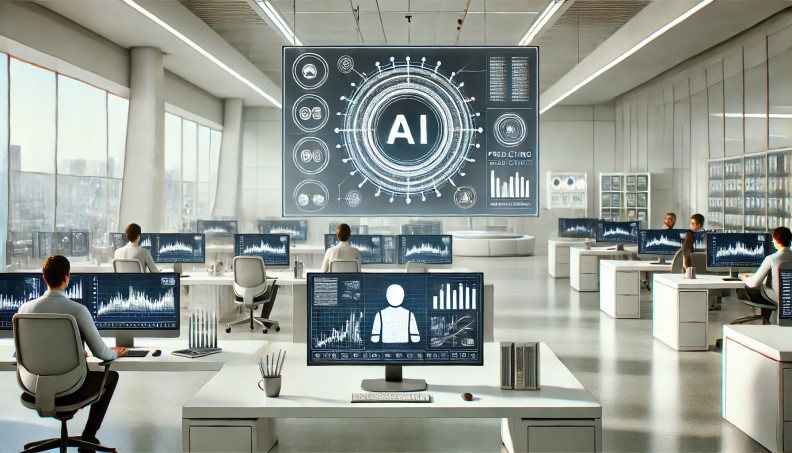AI for predicting market trends is revolutionizing how companies forecast changes in consumer behavior and industry developments. Businesses can no longer rely solely on traditional methods for market analysis and future planning. With vast amounts of data available from various sources, artificial intelligence (AI) is empowering businesses to identify trends more accurately and efficiently. By leveraging AI for predicting market trends, companies can stay ahead of their competitors, make better-informed decisions, and quickly adapt to changing market conditions.
The Role of AI in Market Forecasting
AI for predicting market trends enables businesses to analyze enormous datasets in ways that were previously impossible. Through advanced algorithms and machine learning techniques, AI identifies patterns and correlations that human analysts might miss. This ability to detect patterns from various data points—such as consumer behavior, social media activity, and economic indicators—provides companies with insights into emerging trends and potential shifts in the market.
Traditionally, market forecasting was heavily dependent on historical data and human intuition. While these methods are still valuable, they can be slow, imprecise, and vulnerable to biases. AI technology changes this by analyzing real-time data from multiple sources, improving the accuracy of predictions. This allows businesses to make quicker decisions, especially when dealing with highly dynamic markets.
For example, AI can analyze social media platforms, tracking shifts in consumer sentiment. By studying online conversations, AI systems can predict demand for new products or services, helping companies to adjust their offerings accordingly. The real-time nature of AI analysis means businesses can respond rapidly to consumer preferences, giving them a competitive edge.
AI’s Impact on Consumer Behavior Prediction
One of the key benefits of AI for predicting market trends is its ability to forecast changes in consumer behavior. AI systems can sift through massive volumes of data, including purchase histories, browsing patterns, and demographic information, to identify future buying trends. This allows companies to personalize marketing strategies, creating highly targeted campaigns that resonate with specific customer segments.
Retailers, for instance, can use AI to predict what products will be popular during certain seasons or holidays. By analyzing data from previous years and combining it with real-time insights, businesses can optimize their inventory and avoid overstocking or understocking. Additionally, AI can help forecast shifts in consumer preferences, allowing businesses to develop new products that align with emerging tastes.
Moreover, AI’s ability to process data in real-time means companies can react to sudden changes in consumer sentiment, such as those driven by global events or social movements. This flexibility is crucial for businesses in industries like fashion, entertainment, and technology, where consumer preferences can change rapidly.
Enhancing Financial Forecasting with AI
In addition to consumer behavior, AI for predicting market trends plays a significant role in financial forecasting. AI algorithms can analyze economic data, market reports, and industry-specific trends to provide more accurate financial predictions. By integrating AI into financial planning, businesses can better anticipate revenue fluctuations, identify potential risks, and adjust their strategies accordingly.
For example, AI can analyze global economic indicators to predict how market conditions will impact specific industries. This is particularly valuable for companies involved in international trade, where fluctuations in currency exchange rates or global supply chain disruptions can have significant financial consequences. By forecasting these changes, businesses can take proactive measures to protect their profits and navigate market volatility.
Additionally, AI-driven financial forecasting can help businesses make better investment decisions. By identifying long-term trends, AI enables companies to allocate resources more effectively, ensuring that they invest in the right projects at the right time. This reduces the likelihood of costly missteps and maximizes the return on investment.
Real-Time Adaptation to Market Conditions
One key advantage of AI for predicting market trends is its ability to deliver real-time insights. This capability benefits businesses in fast-moving sectors like tech, retail, and finance. By continuously analyzing data, AI alerts companies to sudden market shifts, allowing quick adjustments in strategy.
For example, if AI detects rising demand for a product, businesses can increase production or launch marketing efforts immediately. Likewise, if AI identifies risks like declining consumer confidence or economic downturns, businesses can adjust prices or reallocate resources.
Real-time adaptability is vital in today’s competitive landscape, where timing often determines success. Companies using AI for market analysis are better equipped to navigate uncertainty and capitalize on opportunities as they emerge.
Challenges of AI Implementation
Despite its advantages, implementing AI for predicting market trends comes with its own set of challenges. For many businesses, integrating AI into their operations requires significant investment in technology, data infrastructure, and talent. AI systems rely on large amounts of high-quality data, and companies must ensure they have the necessary tools to collect, store, and analyze this data effectively.
Another challenge is the complexity of AI models. While AI can provide highly accurate predictions, interpreting these models and understanding their limitations can be difficult. Businesses must invest in training and upskilling their teams to effectively use AI-generated insights. Moreover, AI algorithms can sometimes be prone to bias if they rely on incomplete or skewed data. Ensuring that data inputs are diverse and representative is essential for accurate predictions.
Despite these challenges, the long-term benefits of AI far outweigh the initial difficulties of implementation. As AI technology continues to advance, more businesses are adopting AI-driven tools to stay competitive in an increasingly data-driven world.
AI for predicting market trends is transforming the way businesses operate, providing them with accurate, real-time insights into consumer behavior, financial performance, and market conditions. By leveraging AI’s capabilities, businesses can make more informed decisions, quickly adapt to changing trends, and gain a competitive advantage. Although implementing AI comes with challenges, the benefits of accurate market forecasting and data-driven decision-making are invaluable in today’s dynamic market. As AI technology continues to evolve, businesses that invest in it are better positioned for long-term success.


